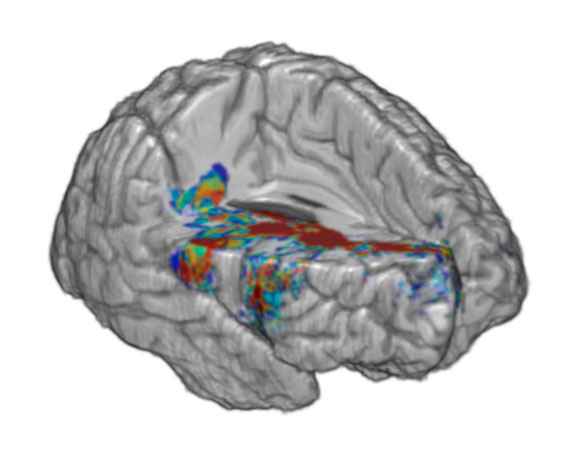Does ignoring negative feedback lead to rigid behavior?
The loss of the flexibility to adapt to new tasks leads to perseverative errors and indicates that a person rigorously clings to past objectives. A research team from the Medical Center Hamburg-Eppendorf (UKE) investigated the underlying deficits of information processing and their neural foundations.

Lesions of the highlighted brain regions can cause reduced evaluation of negative feedback © Jan Gläscher
/UKE/ In our daily routines we must permanently adapt to new tasks. This flexibility of our behavior is enabled by the frontal cortex, which is responsible for monitoring one’s own behavior in relation to the environment, i.e. it regulates conflicts between different objectives. The loss of this ability leads to repetitive mistakes, so-called “perseverative errors” and indicates that a person rigorously clings to past objectives. A research team from the Medical Center Hamburg-Eppendorf (UKE) investigated the underlying deficits of information processing and their neural foundations.
In cooperation with US researchers from the California Institute of Technology and the University of Iowa, the research group led by Jan Gläscher from the Institute for Systems Neuroscience at UKE examined patients with brain lesions. To diagnose deficits in cognitive control and behavioral flexibility, the scientists used the Wisconsin Card Sorting Test, the most widely used neuropsychological test for cognitive reasoning. In this test, patients must sort cards with simple symbols into different stacks without knowing the sort key (color, number or symbol). They learn the sort key from the feedback they receive after each run. After a while, the key changes unannounced, and the patients have to adapt to the new criterion. Patients with extensive frontal brain lesions manage this change only very slowly or not at all and thus make repetitive mistakes (“perseverative errors”).
Analysis of lesion maps with mathematical modelling
Using detailed mathematical modelling, the researchers were able to describe exactly how the information processing in these patients’ brains is disturbed. Apparently, the negative feedback is not sufficiently perceived in case of an error and hence ignored. The patients do not realize that the objectives (sort key) have changed – they continue sorting the cards according to the previous key and make repetitive mistakes. The analysis of the patients’ lesion maps, which is based on structural MR images, shows that the reduced evaluation of the negative feedback resulting in the repetitive mistakes were paralleled by damage to the right frontal and parietal cortex and the connecting fibers beneath.
Emphasizing possible negative consequences of decisions and behavior might help patients with such brain damage to perceive feedback more consciously. This could help them to better adapt to new tasks in their daily lives. Modified translation of the press release of the Medical Center Hamburg-Eppendorf (UKE)
>> original press release (German text)
Original publication
Gläscher J., Adolphs R. & Tranel D (2019). Model-based lesion mapping of cognitive control using the Wisconsin Card Sorting Test. Nature Communications Volume 10, 20. DOI: 10.1038/s41467-018-07912-5




